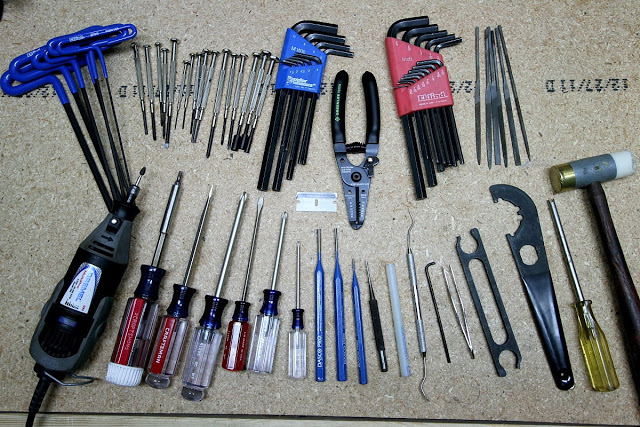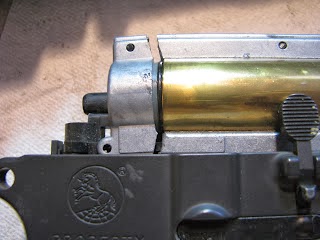 So what does it take to be a good Airsoft tech?
So what does it take to be a good Airsoft tech?
I like to think first and above all is the willingness to learn. Follow this up with the continuous quest for excellence in your work and the end product. Airsoft tech’ing isn’t for everyone, of course. There is a difference between the common dabbler who may only be versed in changing his or hers’ hop up bucking and the full fledged tech who can strip a gearbox down in minutes and diagnose the problem in seconds. There aren’t any college curriculum or training schools that I am aware of that teach Airsoft tech work. Most of this is learned the hard way: through lots and lots of hard work, absorption of previously learned knowledge, and the slow and steady accumulation of experience.
I also believe one does tech work for the love of it. To be a truly well-rounded tech, you have to be passionate about what you’re doing (meaning it’s also fun) – otherwise it can be quite a maddening exercise in futility. If there’s no passion, there’s no interest, and if there’s no interest, there’s no fixing whats broken in that gearbox. We all had to start somewhere, and with most of us, that’s with our very own guns that we’ve taken apart and stared blankly at, followed with a a breathless “oh my God, what have I done!” as you slowly realize that you have forgotten to release the anti-reversal latch before splitting your gearbox halves apart and all your little gears and shims are exploded all over your table. Don’t worry! We all do this at least once on our path to learning 😀
Here’s a few things that are good to have or know if you’re interested in becoming an Airsoft tech – or at least be better able to diagnose and fix your own problems:
- Mechanical aptitude. You need to be comfortable with tools and with mechanical things.You need to have a steady hand and a little finesse. I had a friend who loved to paint plastic model aircraft. Problem was his hands shook so bad during the process that they looked like a paint-by-numbers gone wrong. He had a passion for it, but not necessarily the physical ability. Kudos for trying though.
- The ability to perform basic airsoft maintenance. Compression fixing, shimming, cleaning, gutting, replacement of parts, installing upgrades, etc.
- Willingness to work on some truly awful sh*t. We all know that one guy who has a pile of donkey turd AEG that he continually tries to welfare his way into working existence, but is of course too broke to actually pay for tech work because he spent his lunch money on a COD season pass…. Whether you’re working tech for a living or as a part time side job, or just as a service to friends and acquaintances, you’re going to be accepting some less-than-stellar AEG’s to work on. You may ask yourself why you’re accepting this pile of fecal matter, but since you’re desperate for experience and work, you’ll take it anyway and bludgeon it into working. It’s how you learn.
- Tools, tools, and lots of tools. There are quite a few tools necessary for just basic work. Even more for fully detailed tech work. Some of these can be expensive, and many are certainly required such as a chronograph and a metric allen wrench set. There are also a few tools you may custom modify to suit your needs or be used for AEG’s with particularly hard to reach places or other untold difficulties. Here’s a picture of just a few of the tools necessary, some stock, some modified – there are many, many, many more not pictured:

The razor blade is for cutting your wrists when you hit that inevitable brick wall. - Understanding of the various Airsoft systems and how they work. You need to be able to see the relation of the gears to one another and understand how they function. You need to be able to be able to examine the various internal parts and diagnose the problems accordingly. This requires an attention span and a keen eye. You’re going to be looking for small problems on small pieces, and sometimes these things aren’t readily visible upon first look.
|
|
- Patience, and more patience. You will probably tear apart a gearbox 15 times and spend nearly six hours on the problem before finally figuring out that the tappet plate is binding and causing all your issues. After this lesson, you will learn to check all parameters before reassembly.
- Learning from others and absorbing whatever information you can find. There is a lot of information out there. Some of it is good, some of it is bad (Teflon tape: bad!) You’re going to have to apply yourself and sift through the good and bad. It definitely helps if you have someone experienced and well versed who is able to teach you a thing or two. Finding stuff out on your own is a reward in and of itself as well. And of course, there’s no substitute for actual experience and working on real hardware.
There are of course more things to examine and take into consideration, but I think this article gives you the gist of it without boring you extensively ; )
